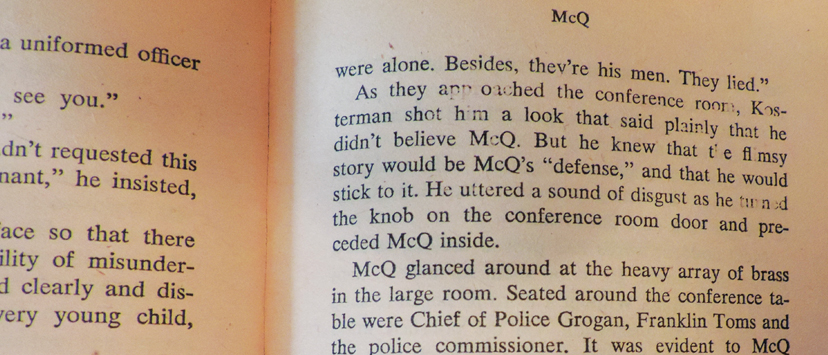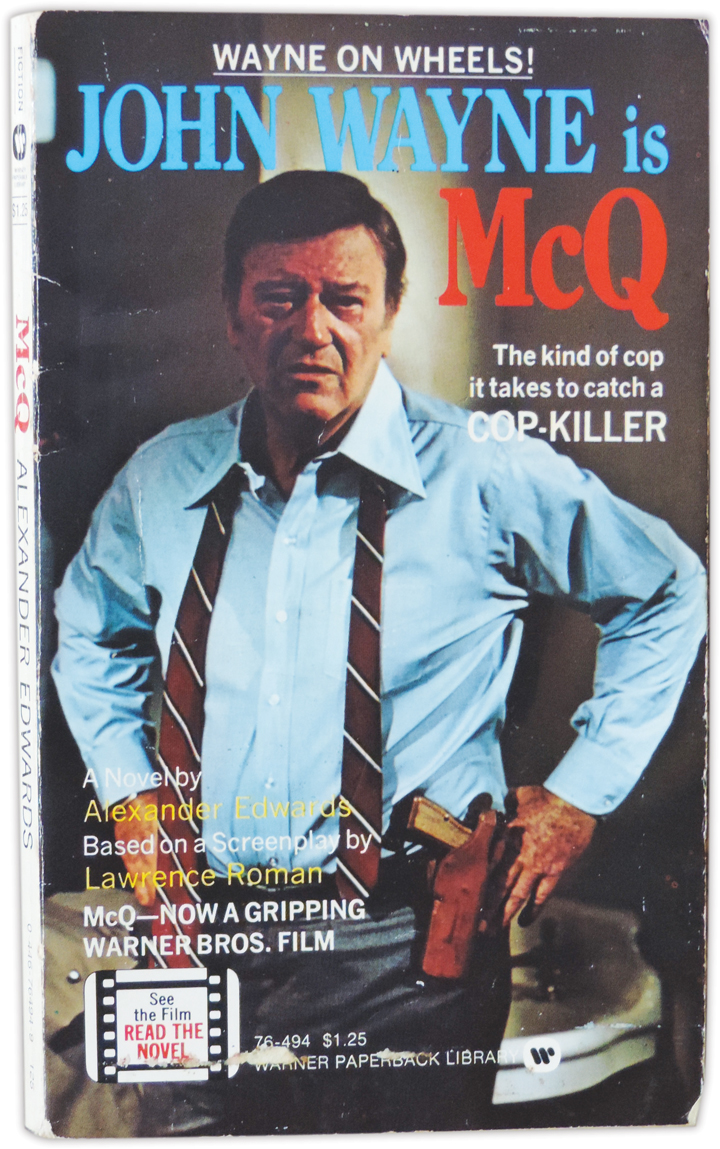
‘McQ,’ the paperback: alternate-universe version of events
By Mark Voger, author, “Monster Mash: The Creepy, Kooky Monster Craze in America 1957-1972″
I am the proud owner of the “McQ” novelization written by “Alexander Edwards” (based on Lawrence Roman’s screenplay), which was published in 1974 by Warner Paperback Library with a cover price of $1.25. In a cruel irony, there’s a glossy color ad for Kent cigarettes smack-dab in the center of the book. (Cigarette-smoking likely figured in John Wayne’s 1979 death from cancer. Duke himself believed it did.)
 My friend, the novelist Wallace Stroby (“The Devil’s Share”), is an inveterate collector of novelizations, and something of an expert on same. Stroby points out that novelizations flourished during a time before home video and YouTube, when opportunities to somehow relive a beloved current movie (short of buying another ticket) were rare.
My friend, the novelist Wallace Stroby (“The Devil’s Share”), is an inveterate collector of novelizations, and something of an expert on same. Stroby points out that novelizations flourished during a time before home video and YouTube, when opportunities to somehow relive a beloved current movie (short of buying another ticket) were rare.
Stroby adds that novelizations were often written by known novelists under nom de plumes. He learned that Alexander Edwards is a pseudonym for Leonore Fleischer, a prolific writer of novelizations (some under her real name).
In those days, novelizations were sometimes written off of screenplays that weren’t yet finalized. Thus, there could be differences between what you saw on screen and in print. “McQ,” the paperback, has several glaring such instances.
■ The paperback McQ doesn’t live on a boat.
■ There’s a sex scene between McQ and and his aging-hooker contact Myra which, in the movie, mercifully happens offscreen. (Let’s all agree we’re glad Wayne and Coleen Dewhurst kept their clothes on while filming.)
■ McQ’s preferred gun, identified as an Ingram 9mm in the movie, is a Mauser in the paperback.
■ The big showdown, which takes place along Pacific Ocean beaches in the movie, happens at a salt-processing plant in the paperback.
■ At the end of the film, when McQ’s old boss Captain Kosterman offers McQ his badge back, it’s implied that McQ accepts it. In the paperback, he flatly turns it down. McQ later tells private eye Pinky there still must be someone higher up in the police department’s chain of command who orchestrated drug heists and cop killings — and McQ aims to find him.
Two excerpts follow.
McQ as described in the paperback: McQ was a man who resembled most closely a mountain that had seen the weathering of thousands of years. A huge man, six feet five and made of stone, he had a weatherbeaten face with crags instead of features. Engraved deeply into it was a weariness borne from long years of hard, frustrating work. For, although McQ was a cop in the deepest, most old-fashioned mold, he was also a loner, a maverick with his own way of doing things.
McQ and Myra get it on: He didn’t flinch as she wound herself around him, her soft weight encompassing him like a hot fog, her tongue searching for his. As her hands reached for and found him, she whispered urgently in his ear, “So it’s not Raquel Welch. Shut your eyes, baby, and dream.”